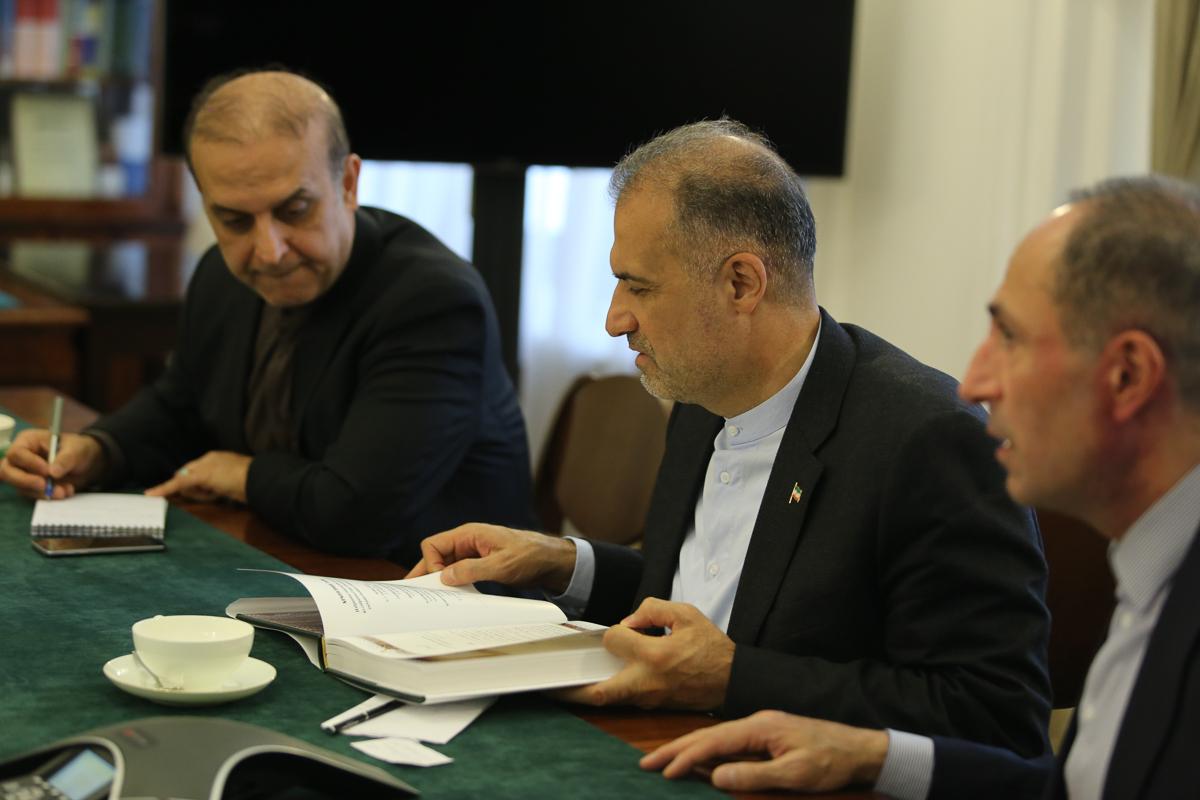Ambassador of the Islamic Republic of Iran Kazem Jalali visits St Petersburg University

As part of the visit to St Petersburg, Ambassador Extraordinary and Plenipotentiary of the Islamic Republic of Iran to Russia Kazem Jalali has met the Rector of St Petersburg University Nikolay Kropachev. Additionally, he delivered a lecture on Iran-Russia relations.
Opened in 2018, the Centre for the Study of the Islamic Republic of Iran is an outcome of the dynamical development of Iranian studies in St Petersburg University and expanding international engagement with the Iranian universities. The meeting was attended by representatives of the Centre for the Study of the Islamic Republic of Iran: Artem Andreev, Associate Professor in the Department of Ethnopolitology; and Ekaterina Pischurnikova, Assistant Lecturer in the Department of Persian Philology.
Nikolay Kropachev and Kazem Jalali discussed issues relating to organising medical services in educational institutions. Nikolay Kropachev spoke about the best practices of the Pirogov Clinic of High Medical Technologies. The parties discussed the prospects of opening a monument to the Iranian linguist, writer and public figure Ali Akbar Dehkhodā at the University and awarding honorary titles to the first persons of Russia and Iran. They also discussed plans to publish a collection of contemporary Russian prose in Iran. The parties had already launched the process to translate and obtain permits for the publication of the almanac from the Iranian government.
Nikolay Kropachev noted that St Petersburg University ranks fifth in the world in the number of online courses on the Coursera platform and is the only Russian university represented on the Chinese XuetangX platform. The University has already launched several courses on the study of Farsi on the OpenEdX platform. Among them are The Persian language. Basic Conversational Course and The Persian Language. Conversational course.
We are ready to develop joint online courses for the international online educational platform Coursera. It will help promote the Persian language and culture globally.
Nikolay Kropachev, Rector of St Petersburg University
‘Apparently, providing information on the history of Iran is essential as is sharing information about modern Iran since, I am sure, not much reliable and fair information in the world about the current state of affairs in your country is available,’ said the Rector.
Ambassador Kazem Jalali was invited to head the council of one of the academic programmes in International Relations and to take part in the ceremony celebrating the opening of the representative office of St Petersburg University at the University of Tehran. Mr Jalali said that he would gladly accept all proposals as ensuring interaction with universities was among the key areas of his work.
Since 2019, the AMFA Persian exam has been held at the St Petersburg University Language Testing Centre. The University is the first place in the world outside of Iran to offer this exam.
On the second day of the visit, Kazem Jalali delivered an open lecture for students and academic staff. The lecture was moderated by Professor of St Petersburg University Niyazi Niyazov. Apart from the diplomatic work, Kazem Jalali has been engaged in research: he defended his dissertation and received a degree of Candidate of Political Science from Imam Sadik University.
The relations between Russia and Iran today are at a favourable level and are actively developing in various directions, he said. This can be evidenced by close contacts between the leaders of both countries, i.e. Russian President Vladimir Putin and Ebrahim Raisi, President of the Islamic Republic of Iran, who was elected in August 2021.
Russia has provided great support to Iran in the process of joining the Shanghai Cooperation Organisation. Today, we are on the way to join the Eurasian Economic Union.
Kazem Jalali, Ambassador Extraordinary and Plenipotentiary of the Islamic Republic of Iran to Russia
The volumes of the Russian-Iranian trade turnover are growing rapidly, said the Ambassador. In 2020, the volume of exports from Iran to Russia increased by 105%, with the total trade turnover between the countries increasing by 44%. In the near future, we are planning to fully open the International North-South Transport Corridor (INSTC), i.e. a multimodal route for transporting passengers and goods from St Petersburg to the Persian Gulf with a length of over 7,000 kilometres. This large-scale project is particularly important for the economies of Iran, India, Azerbaijan, and Russia, said Kazem Jalali.
Kazem Jalali paid special attention to the issues of independence and sovereignty. The sanctions and pressure exerted on Iran by Western countries have given impetus to strong domestic economic growth, he said. Both Iran and Russia oppose single-person global governance and imposition of democracy supporting the idea of pluralism and the right of countries to self-determination, as he put it. In this sense, Iran-Russia relations are developing on the basis of the principles of mutual respect and non-interference in each other's internal affairs.
The lecture ended with a discussion, and everyone could ask him questions. In particular, the audience was interested in Iran's position on: the Azerbaijani-Armenian conflict and the situation in Afghanistan; aspects of religious diplomacy; and the development of economic partnership with Russia to name but a few.

